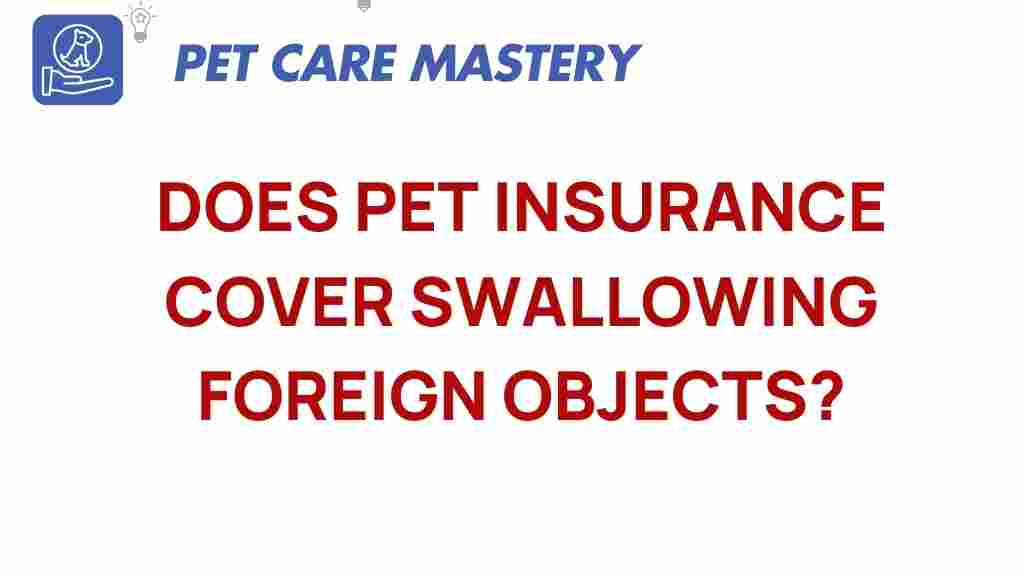Understanding Pet Insurance: Does It Cover Foreign Object Ingestion?
When it comes to caring for our furry friends, pet insurance is often a topic of discussion among pet owners. Many pet parents wonder if their policy will cover unexpected incidents, such as foreign object ingestion. This article will unpack the complexities of pet insurance, focusing on whether it covers foreign object ingestion, how to navigate your policy, and tips for ensuring your pet’s health without breaking the bank.
What is Pet Insurance?
Pet insurance is a type of health insurance designed to help cover veterinary costs for your pets. Much like human health insurance, it can alleviate the financial burden of unexpected medical expenses. With pet insurance, you can ensure your furry companion receives necessary medical care without the stress of high veterinary bills.
- Types of Coverage: Pet insurance typically includes accident and illness coverage, wellness plans, and accident-only plans.
- Premiums: Monthly payments vary based on the pet’s age, breed, and overall health.
- Deductibles and Co-pays: Policies often come with deductibles (the amount you pay before coverage kicks in) and co-pays (the percentage you pay after the deductible is met).
Foreign Object Ingestion: A Common Concern
Foreign object ingestion occurs when pets swallow items that are not food, such as toys, clothing, or household items. This can lead to serious health complications, requiring immediate veterinary attention. Pet owners often find themselves asking, “Will my pet insurance cover this?”
Does Pet Insurance Cover Foreign Object Ingestion?
The short answer is: it depends on your specific pet insurance policy. Most comprehensive pet insurance plans will cover foreign object ingestion, but there are important factors to consider. Here’s a breakdown:
1. Type of Plan
Different plans offer varying levels of coverage:
- Accident and Illness Plans: Typically cover foreign object ingestion, as it falls under accidental injuries.
- Accident-Only Plans: Generally cover foreign object ingestion, but might not cover complications arising from pre-existing conditions.
- Wellness Plans: Usually do not cover foreign object ingestion as they are designed for preventive care.
2. Policy Exclusions
Every pet insurance policy has exclusions. It’s crucial to read the policy documents carefully. Common exclusions related to foreign object ingestion include:
- Pre-existing Conditions: If your pet has a history of eating non-food items, this may be deemed a pre-existing condition and not covered.
- Waiting Periods: Many policies have waiting periods before coverage begins, during which any incidents may not be reimbursed.
- Specific Breeds: Some policies may have breed-specific exclusions, particularly if the breed is prone to certain behaviors.
3. Claim Process
If your pet ingests a foreign object and you seek coverage, follow these steps:
- Visit the Vet: Always take your pet to the vet immediately. Diagnosis and treatment are crucial.
- Document Everything: Keep all invoices, records, and any relevant documentation from your vet.
- File a Claim: Submit your claim to your insurance provider with all necessary documentation.
- Follow Up: Ensure you follow up with your insurance company for any additional information they may require.
4. Costs Associated with Foreign Object Ingestion
The costs associated with treating foreign object ingestion can vary significantly based on the severity of the situation:
- Initial Consultation: $50 – $200
- X-rays or Ultrasound: $200 – $500
- Surgery: $1,000 – $3,000 (depending on the complexity)
- Post-operative Care: $100 – $500
Having pet insurance can significantly reduce out-of-pocket expenses in these situations.
Tips for Choosing Pet Insurance
When selecting pet insurance, consider the following:
- Compare Plans: Look at multiple providers to find the best coverage for your needs.
- Read Reviews: Customer reviews can provide insight into the claims process and overall satisfaction.
- Check for Discounts: Many companies offer discounts for multiple pets, military members, or annual payments.
- Understand Policy Limitations: Be aware of any waiting periods, exclusions, and annual limits on coverage.
Common Questions About Pet Insurance and Foreign Object Ingestion
Here are some frequently asked questions regarding pet insurance and foreign object ingestion:
1. Will my pet insurance cover all types of foreign objects?
Coverage typically includes most foreign objects, but always check with your provider for specific exclusions.
2. What if my pet is a habitual chewer?
If your pet frequently ingests non-food items, consider discussing this behavior with your vet and check your policy for related exclusions.
3. Can I get pet insurance after my pet has ingested a foreign object?
Most insurers will not cover incidents that occurred before the policy was established, so it’s best to obtain coverage early.
Troubleshooting Tips for Pet Owners
If you find yourself in a situation where your pet has ingested a foreign object, here are some troubleshooting tips:
- Stay Calm: Your pet can sense your anxiety, which can make the situation worse.
- Assess the Situation: Determine if your pet is showing signs of distress, such as vomiting, lethargy, or pain.
- Contact Your Vet: Always consult your veterinarian for the best course of action.
- Have Emergency Numbers Ready: Know your vet’s number and the nearest emergency animal clinic.
Conclusion
In summary, pet insurance can be a valuable tool in managing the unforeseen costs associated with foreign object ingestion. Understanding your policy and what it covers is essential for ensuring your pet receives the best care possible. By being proactive in your pet’s health and selecting the right insurance plan, you can enjoy peace of mind, knowing that you are prepared for emergencies.
For more information on pet insurance options and to compare different policies, visit this helpful site. Additionally, if you’re looking for tips on how to keep your pet safe from foreign objects, check out our detailed guide.
Remember, your furry friend’s health is worth the investment, so make sure you’re adequately covered!
This article is in the category Health and created by PetCareMastery Team
